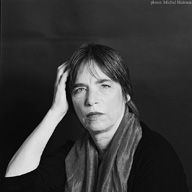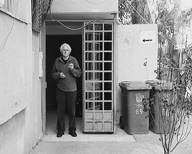Juror
Nurith Aviv
 [Juror’s Statement]
[Juror’s Statement]
It was in the early Nineties, at the Jerusalem Film Festival, that I first discovered Asian cinema. I was already intrigued by Asian films that I had occasionally seen in Paris, but this was my first sustained exposure to this cinema. I found myself sitting for long hours in the theater—bewitched.
The films, though very different from each other, struck an inner chord. The modern minimalist narrative, almost abstract, the rhythm, the colors, the lighting, the frames, the long shots, the silences—all expressed a new cinematographic grammar, far from what I had been taught, and yet so close.
Be it a feature film or a documentary film, beyond the passionate story, it is the rhythm, the hidden music that interests me most.
Now I am happy to be invited to Yamagata, to join my jury colleagues with their diverse biographies. I’m sure it will be a great adventure to accomplish this impossible mission of choosing the best films, the ones that speak the best cinematographic language.
Considered the first female director of photography of fiction films in France, she has shot over a hundred fiction and documentary films, with directors such as Agnès Varda, Amos Gitai, Rene Allio, and Jacques Doillon. She has herself directed eight documentaries, including Kafre Qara, Israel (1989), Circumcision (2000), Loss (2002), and Sacred Language, Spoken Language (2008). Her filmography as D.O.P. runs from 1967 and includes Varda’s Daguerreotypes (1975), One Sings, the Other Doesn’t (1977), Jane B. by Agnès V. (1987); Gitai’s Field Diary (1982), Golem (1992), A House in Jerusalem (1998), Wadi Grand Canyon (2001); Eyal Sivan’s Jerusalem, Borderline Syndrome (1994); Purity (2002) by Anat Zuria, screened at YIDFF 2003; and films by Mira Nair, Claude Berri, William Klein, and others. |
From Language to Language
Misafa Lesafa FRANCE, GERMANY, ISRAEL / 2004 / Hebrew / Color / Video / 55 min
FRANCE, GERMANY, ISRAEL / 2004 / Hebrew / Color / Video / 55 min
Director: Nurith Aviv
Photography: Philippe Bellaïche
Sound: Tully Chen
Editing: Michal Ben Tovim, Philippe Boucq, Galith Wajnberg
Research: Shani Littman
Sound Editing: Benoit de Clerck
Producer, Source: Frédéric Luzy
Co-producers: Marek Rozenbaum, Itai Tamir, Luc & Jean-Pierre Dardenne
Production Companies: Swan Productions, Transfax Films, Dérives
Hebrew, for centuries a sacred language, a language of scriptures and prayers, is now the language of everyday life in Israel. But if Hebrew has been able to take over in a few decades, this has not always been without violence upon the other languages spoken before. Nine poets, writers, singers, and actors speak of the relationship between Hebrew and the language of their childhood—a language whose music still echoes in them even when it is no longer spoken.
